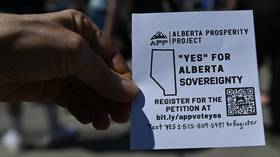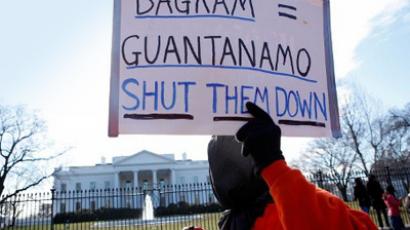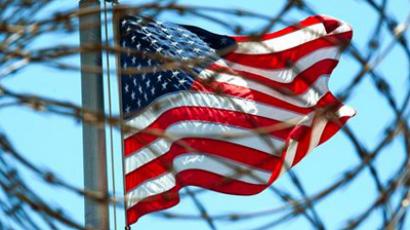‘Majority of Gitmo prisoners innocent’
Protests have marked 10 years since the first prisoners were sent to America’s most controversial prison – Guantanamo Bay, Cuba. Barack Obama's promise on his first day in office to close it down remains unfulfilled.
And that promise never rang more hollow than last month, when he signed a new law allowing the indefinite detention of terror suspects.Wednesday, 11 January 2012, is probably just another day for the inmates of Guantanamo Bay. They may not even know that people around the world are campaigning for them. But as far afield as London, demonstrations are held to demand the release of the 171 men still held without trial in the Cuban camp, some for the entire 10 years.View RT’s Gitmo photo gallery“To me, as an American, it means we’ve been holding men, 171 men still, for 10 years, without fair trial and without access to lawyers for a large amount of that time,” a Reprieve paralegal, Cortney Busch, told RT. “To me, as a human being, and as their lawyer, it means that these men don’t know if, or when, they’re going to leave Guantanamo.”One of those men is Shaker Aamer, who has earned the dubious distinction of being the last British resident held in Guantanamo. He was in Afghanistan on 9/11, he says doing charity work, digging wells and building a girls’ school in Kabul. When the US invasion began, Aamer went into hiding from an increasingly wary Northern Alliance. But his freedom did not last – Shaker’s supporters maintain he was sold for a bounty.“He went into the hands of the Northern Alliance, who were warlords, basically, and then sold to the Americans,” says Joy Hurcombe, a chair of the Save Shaker Aamer campaign. “And as it happens, Shaker Aamer has lived in America, and has an American accent, and he actually thought: ‘Oh, the Americans, thank goodness, they’ll save me from the torture.’ He’d had months of torture by then. But no, he was transported to Guantanamo.”And there he has remained, despite President Obama’s original election pledge to close Guantanamo altogether, despite being cleared for release, and despite being a legal permanent resident in the UK, with a family in London, which includes one son he has never even seen.And far from moving closer to being freed, Shaker’s supporters see worrying developments in the US’s attitude to extra-judicial detention. Obama recently signed the National Defense Authorization Act, which places domestic terror investigations into the hands of the military, and extends a ban on transferring prisoners out of Guantanamo.“The proper way to deal with terrorism is under the normal criminal law and not to have this legal black hole which Guantanamo and the military commissions have represented,” Baroness Ludford, MEP, told RT. “And I’m very sorry indeed that Obama, for reasons of lack of political will, or inability to deliver, has not lived up to that promise. And indeed, he’s now proposing to put American citizens into trials in military commissions, which are very far from being fair trials with due process.”The British government has requested the release of Aamer, but there has been no movement on the case since 2007. Meanwhile, as his family grows up without him, he lives out his life in a tiny windowless cell, not knowing if he can ever expect to be released.While hundreds may have protested against Guantanamo prison in the US, investigative reporter Jason Leopold told RT that the majority of the public tends to ignore an issue that stains their country's reputation.“It is an issue, an abuse that we condemn other governments for. However, what’s happening now is that we have come to accept indefinite detention,” he said. “I think that people are willing to accept it now, it doesn’t affect them. Let’s face it – they look at this as an issue that they do not need to be concerned about, because they still see the majority of people there as terrorists, even though we have seen evidence surface over the years that the vast majority were in fact innocent.”














